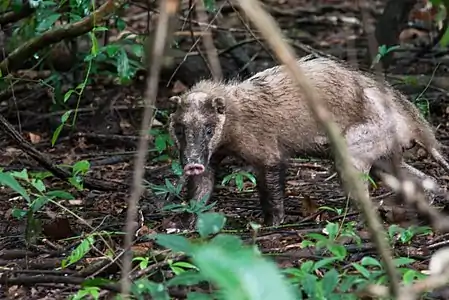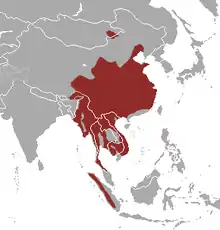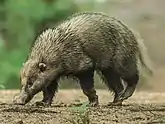Hog badger
Hog badgers are three species of mustelid in the genus Arctonyx. They represent one of the two genera in the subfamily Melinae, alongside the true badgers (genus Meles).
| Hog badger | |
|---|---|
 | |
| A. collaris | |
| Scientific classification | |
| Domain: | Eukaryota |
| Kingdom: | Animalia |
| Phylum: | Chordata |
| Class: | Mammalia |
| Order: | Carnivora |
| Family: | Mustelidae |
| Subfamily: | Melinae |
| Genus: | Arctonyx Cuvier, 1825 |
| Type species | |
| Arctonyx collaris | |
| Species | |
 | |
| Distribution of the genus Arctonyx | |
Taxonomy
Arctonyx was formerly considered a monotypic genus containing one species, A. collaris, but a 2008 study found it to comprise 3 distinct species, a finding later followed by the American Society of Mammalogists.[1][2]
Species
Three species are known:[2]
| Image | Scientific name | Distribution |
|---|---|---|
| Northern hog badger (A. albogularis) | South and East Asia. | |
 | Greater hog badger (A. collaris) | Southeast Asia. |
| Sumatran hog badger (A. hoevenii) | Sumatra in Indonesia. | |
Conservation
The IUCN considers the greater hog badger (A. collaris), the northern hog badger (A. albogularis) and the Sumatran hog badger (A. hoevenii) as three separate species. The greater hog badger is listed as a Vulnerable species. The other two are listed as Least Concern.[3][4]
References
- Helgen, Kristofer M.; Lim, Norman T.-L.; Helgen, Lauren E. (2008). "The hog-badger is not an edentate: systematics and evolution of the genus Arctonyx (Mammalia: Mustelidae)". Zoological Journal of the Linnean Society. 154 (2): 353–385. doi:10.1111/j.1096-3642.2008.00416.x. ISSN 1096-3642. PMC 7107037. PMID 32287392.
- "Explore the Database". www.mammaldiversity.org. Retrieved 2021-06-25.
- Helgen, K.; Chan, B. (2016). "Arctonyx albogularis". IUCN Red List of Threatened Species. 2016: e.T70206273A70206436. doi:10.2305/IUCN.UK.2016-1.RLTS.T70206273A70206436.en. Retrieved 16 December 2019.
- Holden, J.; Helgen, K.; Shepherd, C.; McCarthy, J. (2016). "Arctonyx hoevenii". IUCN Red List of Threatened Species. 2016: e.T70205771A70205927. doi:10.2305/IUCN.UK.2016-1.RLTS.T70205771A70205927.en. Retrieved 16 December 2019.
This article is issued from Wikipedia. The text is licensed under Creative Commons - Attribution - Sharealike. Additional terms may apply for the media files.